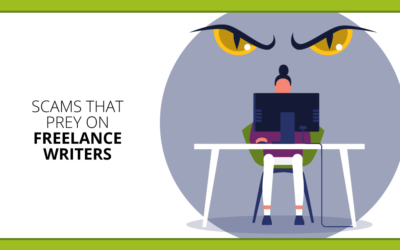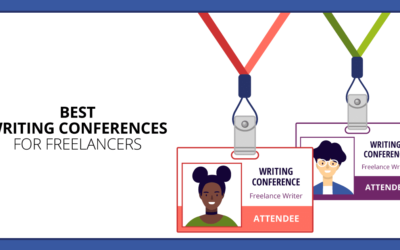
Once we get one, we tend to feel stuck. It can take ages to find a better client and fire that annoying, low-paying client go.
I actually heard recently from one writer who’d been writing for one underpaying client for 12 years. She wanted to know how she could get a raise out of them. After you’ve been their doormat for over a decade, that’s going to be tough.
Please, don’t do this!
Luckily, there is a fairly simple way to avoid getting stuck in long-term relationships with bad freelance writing clients. It has to do with getting in touch with how you feel when you’re offered a gig.
Call it your Martian antenna. Your spidey-sense. Your inner homing pigeon.
But whatever you call it, you have an instinct within you that can help you detect bad client situations — and I’m going to teach you how to use it right now. It’s one of four critical factors you want to see to feel confident this is a great client for you to take on.
1. Listen to your gut
Writers have instincts about whether a client is going to be good for them. Unfortunately, in our rush to book another dollar of income, we often ignore them.
Instead, I want you to focus on what your gut tells you about the client.
When you’re talking to them, do you feel relaxed? Are you having a good time? Or do you feel sort of nervous and sick to your stomach.
Do they seem sort of crazy? Like a big bullshitter?
Most importantly, could you imagine yourself working with this person over a prolonged period?
If the answer is ‘no,’ you want to pass.
For instance, I once got a reach-out from a guy who wanted to do an initial Skype conversation. I dial him up, and the guy wants to free-associate with me about his vague writing project ideas, while Rush Limbaugh blasts on TV in the background — and he walks his treadmill, in a sweaty t-shirt. I thought he was a bombastic blowhard, and I quickly passed.
I prefer people who treat me professionally, so my “gut” said no on this one.
Another gut-check moment is if you ask about a contract or an up-front deposit, and the client balks. This is a big red flag that they don’t deal much with freelancers, and won’t be a pleasant experience for you.
When you only work for clients who make you feel good, life is good. And you tend to earn more. You’ll do better work for clients you like, and who you get a good vibe from. So tune in to what your gut is telling you about the client, and follow its lead.
2. Qualify your prospect
Besides relying on your gut instincts about whether this is a growth opportunity for you and you like the client on a personal level, you need to research your prospect to see if they’re a good publication or company to work for.
This doesn’t have to take days to do, thanks to The Google (as we old bags like to say). Google “problems at X company” or “X magazine sucks” and see what comes up. Can be a real eye-opener sometimes.
Also, be sure to ask around your network – anybody worked for this client before? How slow do they pay? How well?
Finally, if it’s a company, return to The Google to check them out on Hoover’s or Manta, or find them in a local business journal. See if you can get a sense of annual revenue, or of subscriber numbers, for a magazine. Read a magazine’s advertisers’ guide and find out if readers are plentiful, or well-off. You want at least one or the other.
Find out how long this prospect has been around. For a company, you want at least $1 million in revenue — and $10 million is better. $100 million, even better. I recently spoke to one writer who said she was marketing to small businesses with $100,000 in revenue. Honey, that’s just too small to have any kind of a serious marketing budget.
3. Think reputation
Next, to make sure you’ve got a great client on the hook, consider how important reputation is to them.
Could they not pay you, without damage to their business? Are they shadowy figures that only do business online, from some far-off land? Ask yourself if a well-placed tweet about your overdue payment would cause them big trouble.
I prefer to look for companies and magazines that have worked hard to build their reputation, and are motivated to keep it.
For instance, one current client of mine is a mergers-and-acquisitions consultant. It’s critical that he uphold an impeccable reputation, so that clients trust him to sell their businesses and get them the money they need to retire. It would be unthinkable for him to stiff me on $1,000 he owes me — it’s just not worth the reputation risk.
That means I can relax and enjoy the gig. I’ve got no worries about payment.
4. Ask this question
Finally, as I look back on my favorite gigs — the wonderful editors and companies that paid super-great — I find they have one thing in common. It wasn’t so much the great pay, though that was usually there.
Here’s the key question to ask to find out if this is really a client with terrific potential to help you career:
Is there an opportunity to learn something new here?
Nearly every great client I’ve had provided me with opportunities to stretch my skills. They pushed me, forced me to dig deeper, to do one more interview, to rewrite it one more time, to learn a new writing style or project type.
At Forbes, for instance, they actually put on training Webinars for the blogging crew! I love them for it. I’ve learned a ton from them about how to get a big audience for a blog post, and it keeps me engaged and excited to write for them.
I’ve had other clients where they offered me the opportunity to learn new types of writing — to write my first case study, special report, and white paper, for instance.
Many writers avoid these “stretch” gigs, worrying that they won’t be able to pull them off. That’s not the right attitude for a successful freelance writer.
Instead, think of yourself as a first responder, like the firemen and medics who run towards the fire, while everyone else flees. This is your role as a freelance writer — you should be compulsively drawn to the challenge of executing a tough assignment.
Nearly all the really great-paying assignments require this sort of daring.
So take the tough gigs. Keep learning. When you think you’ve learned all you can with a client, it’s probably time to start looking to replace them with one that will challenge you in new ways.
How do you avoid bad clients? Leave a comment and add your tips.










